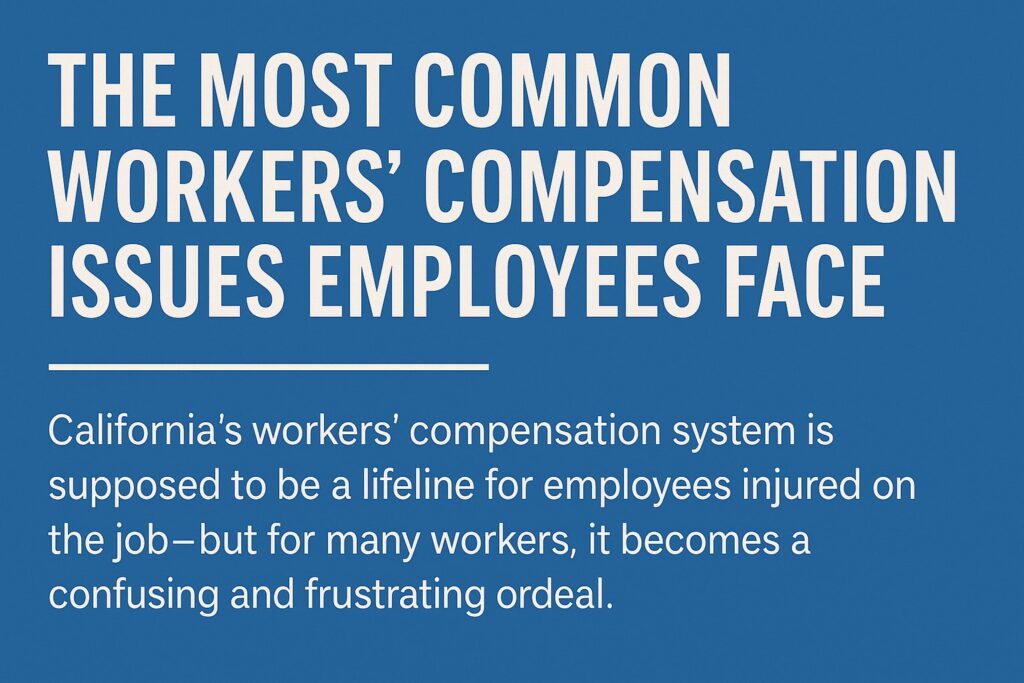
California’s workers’ compensation system is supposed to be a lifeline for employees injured on the job—but for many workers, it becomes a confusing and frustrating ordeal. At Employees First Labor Law, we’ve helped thousands of injured workers navigate the system and fight back against bad-faith insurance tactics. Based on our experience, here are the most common workers’ compensation issues employees face—and how to protect yourself.
1. Denied Claims for No Good Reason
One of the most frequent problems is when legitimate claims are denied without explanation. Insurance companies may say the injury wasn’t work-related, claim it was due to a “preexisting condition,” or argue that you didn’t report it fast enough. These denials can be appealed—but many workers don’t know their rights or how to fight back.
🔗 Related: What Is AOE/COE and How Does It Impact My Workers’ Comp Case?
2. Delayed Medical Treatment
You are legally entitled to prompt medical care after a work injury. Unfortunately, delays are common—insurance companies often drag their feet approving treatment, deny specialist referrals, or ignore doctors’ recommendations. These delays can worsen your condition and hurt your case.
🔗 Related: Delayed Medical Treatment in Workers’ Compensation: Know Your Rights
3. Inaccurate Wage Loss Payments
Temporary Disability (TD) benefits should cover two-thirds of your wages—but adjusters often underpay by excluding overtime, commissions, or secondary jobs. Others miscalculate your Average Weekly Wage (AWW), leaving you with less money than the law provides.
🔗 Related: Temporary Disability Benefits: What You Need to Know
4. Pressure to Return to Work Too Soon
Injured employees often face pressure from employers or insurance adjusters to return to work before they’re physically ready. If your doctor hasn’t released you or if you can’t perform your usual duties, you have the right to stay off work or request accommodations or modified tasks.
🔗 Related: Can I Choose My Own Doctor in a Workers’ Comp Case?
5. Employer Retaliation After Filing a Claim
California Labor Code § 132a protects employees from retaliation for filing a workers’ compensation claim. But employers may still retaliate—by cutting hours, writing you up, or even terminating your employment. This can lead to an additional legal claim or even a wrongful termination lawsuit.
🔗 Related: Retaliation and Termination for Work Injuries
6. Confusing Forms and Missed Deadlines
The system is filled with technical deadlines—appealing denials, requesting Qualified Medical Evaluators (QMEs), filing for Independent Medical Review (IMR), etc. Missing even one of these deadlines could result in lost benefits. Don’t wait—talk to a workers’ comp attorney early in your case.
How EFLL Helps Injured Workers Overcome These Issues
At Employees First Labor Law, we take over the fight so you can focus on healing. We help workers by:
- Appealing denied claims and treatment delays
- Demanding proper wage calculations and penalties
- Holding employers accountable for retaliation
- Guiding you through every deadline and legal filing
Whether you’re just starting your claim or stuck in limbo, we’re ready to help you take control.
Take Action Today
Don’t let delays, denials, or pressure ruin your recovery. If you’ve been injured at work and are facing any of these issues, contact EFLL today for a free case review. We fight to get injured workers the treatment and compensation they deserve.
📞 Call now or visit our Workers’ Compensation page to schedule a free consultation.
📩 Submit Your Case Confidentially



